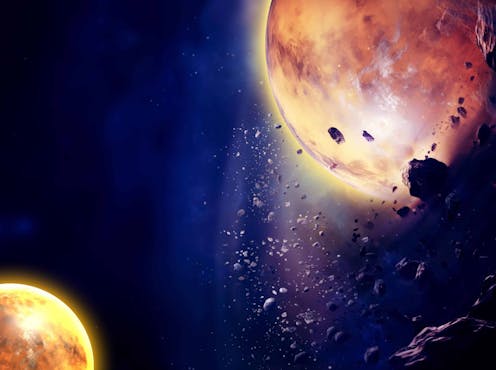Planet cannibalism is common, says cosmic ‘twin study’
- Written by Yuan-Sen Ting, Associate Professor, Astrophysics, Australian National University

How stable are planetary systems? Will Earth and its seven siblings always continue in their steady celestial paths, or might we one day be randomly ejected from our cosmic home?
Physicists understand the rules that govern the orbits of two celestial bodies, but as soon as a third is added (let alone a fourth, fifth, or hundredth) the dynamics become far more complex. Unpredictable instabilities arise, in which an object may be randomly ejected into space or fall into its host star.
The so-called “three-body problem” has troubled scientists for centuries (and more recently forms the premise of a bestselling series[1] of science fiction novels and a new Netflix adaptation[2]). One obstacle to understanding it has been that we know relatively little about how common it is for such catastrophic instabilities to arise.
In a new study published in Nature[3], we and our colleagues have shed some light on this question. In a survey of nearby stars, we found as many as one in dozen pairs of stars may have devoured a planet, likely because the planet developed a “wobble” in its orbit and fell into the star.
Studying twins
Our study found at least 8% of pairs of stars in our sample show chemical anomalies indicating one star had engulfed planetary material that once orbited it.
To detect this subtle signal, we had to rule out other possible explanations for these chemical patterns. So we focused on “twin stars”, known to have been born at the same time from the same mix of materials.
This approach can eliminate confounding factors, in the same way that studies of twins are sometimes used in sociological or medical research.
The result comes from a survey of twin stars named C3PO[4] which one of the authors (Ting) initiated in the US, and Liu and others later joined.
Our team collected an exquisite sample of spectroscopic data from 91 pairs of twin stars – many times larger than similar studies conducted in the past.
We found that some stars differed from their twins, showing a distinct chemical pattern with higher amounts of certain elements like iron, nickel and titanium compared to others such as carbon and oxygen. These differences indicate strong evidence that the star has ingested a planet.
Instabilities may be unexpectedly common
If a host star engulfs one or more members of a planetary system, it suggests some instability in the dynamics of the system must have occurred.
Simulations suggest such instability may be common in the early life of a planetary system – the first 100 million years or so. However, any traces of planets engulfed during this early period would be undetectable in the stars we observed which are billions of years old.
Read more: New evidence for an unexpected player in Earth’s multimillion-year climate cycles: the planet Mars[5]
This suggests the chemical anomalies we saw were caused by more recent instabilities, causing the stars to consume some planets or planetary material.
This revelation is not entirely unexpected. Theorists who study planetary dynamics, including our co-author Bertram Bitsch, have noted that many planetary systems are known to be unstable, especially among systems with a kind of planet called a “super-Earth” – somewhat larger planets than Earth but far smaller than giants like Jupiter.
Systems including a super-Earth planet may be particularly unstable. The gravitational tug-of-war between the host star and its massive planets might generate instability.
A delicate balance
Our study encourages us to reconsider our place in the universe. While we take stability for granted in our Solar System, this may not be normal throughout the cosmos.
Our study does not suggest we are likely to see such instabilities in our own Solar System. Even with our new results, however, it is important to recognise that planet engulfment and instability still occur only in a minority of cases.
We hope our study will inspire more people to study planetary systems and their relationship with their host stars. Our understanding of the dynamics of multiple-body systems is still very much incomplete.
As we continue to explore the mysteries of the cosmos, studies like this remind us of the delicate balance that allows life to thrive on Earth and the potential fragility of our cosmic home.
Read more: The Three-Body Problem: Liu Cixin's extraterrestrial novel is a heady blend of politics, ethics, physics and Chinese history[6]
References
- ^ bestselling series (www.bloomsbury.com)
- ^ new Netflix adaptation (www.netflix.com)
- ^ published in Nature (www.nature.com)
- ^ C3PO (academic.oup.com)
- ^ New evidence for an unexpected player in Earth’s multimillion-year climate cycles: the planet Mars (theconversation.com)
- ^ The Three-Body Problem: Liu Cixin's extraterrestrial novel is a heady blend of politics, ethics, physics and Chinese history (theconversation.com)
Read more https://theconversation.com/planet-cannibalism-is-common-says-cosmic-twin-study-225990

















